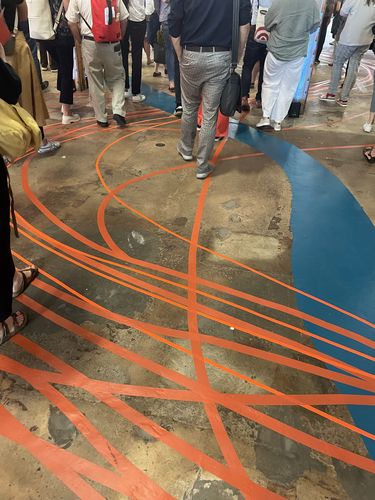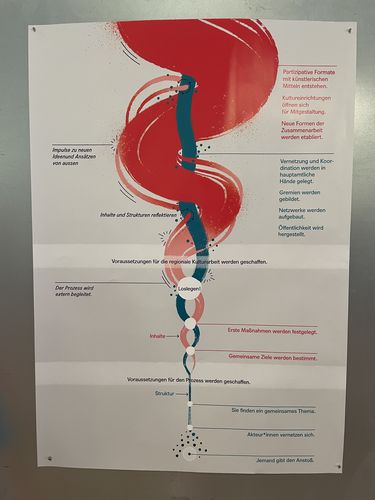Participation - Networking - Transformation
Red, orange, and blue-green stripes run through the room (Image 1). Three different colored streams spring from a starting point. Intertwined, they pile up into a whirlwind-like structure that captivates the entire hall. The participants follow the vortex along several nodes. From the impetus, through a shared theme, shared goals and measures to getting started. This is the process chart (Image 2). The chart that describes the processes and steps of regional cultural work projects. What are these processes exactly? What steps must be taken in planning and implementing a project? And why is the point of getting started so high up? What the whirlwind is all about, participants learned during the event.
Let's start with the basics:
Why the country?
Why are we talking about the country? Isn't it much easier to focus on cultural work in big cities? There, where the cultural infrastructure is developed, where theaters and museums shape the cityscape, where concerts and art exhibitions are part of everyday life.
Perhaps easier, but that's the crux of the matter. The (cultural) infrastructure in rural areas is undoubtedly deficient compared to well-connected cities. Nonetheless, it must not be overlooked that a large part of the population of Germany lives outside the metropolises, as Kirsten Haß, Director of Administration at the Federal Cultural Foundation, emphasized at the beginning of the conference. This overwhelming majority of fellow citizens must not be left behind. We should not expect people "from the countryside" to simply come to the city to take advantage of cultural offerings. Jörg Freese from the German Association of Rural Districts chimes in here. We should not be talking about THE countryside in the first place. When we talk about rural areas, we must always also take into account the associated diversity. Because rural area is not the same as rural area. Dietger Wille, Deputy District Administrator of Vorpommern-Greifswald District, points out that the size of a region is not only determined by its population, but also by its actual geographical size, so that rural areas can differ significantly even within a region. Rural areas are therefore characterized not only by each other, but also by diversity within themselves. Although there may be common challenges that can also be considered generalized. The Corona pandemic has hit rural cultural institutions, like so many other areas, hard. While this was often a widely discussed topic in the big cities, "institutions in rural regions died a quiet death", according to Freese. The periphery must therefore be much more focused on both research and policy. Because the cultural workers in rural areas have a very important task. The provision of services includes not only shopping options, bus schedules or the distribution of doctors, but also cultural offerings, however diverse they may be.
Why culture?
Why are we talking about culture at all? Aren't there much more pressing problems at this time? Don't we have to talk about basic prerequisites such as medical care, internet access, and education before we discuss such a seemingly mundane matter as culture? Dr. Jens Mischak, the first Deputy District Administrator (CDU) in the Vogelsberg district in Hesse sees it differently. He says: "Culture creates value." How empirical data supports this statement is shown by David Adler, Project Manager "Kulturlandbüro" Uecker-Randow, and author Gertje Graef. Together, in the framework of an artistic village residency in the village of Uecker-Randow, they have placed the identity-forming characteristics of art and culture for village residents at the forefront of their work. Both emphasize: Culture arises on site. External impulses, ideas, questions, stimuli, or even provocations can come from outside. A project is only really successful when external impulses stimulate local cultural practices and the people giving the impulses feel at the end that the project will continue without them. This is also in line with what Stefanie Kruse, Team and Project Coordinator "KreisKultur" Rendsburg-Eckernförde, and Dr. Juliane Rumpf, District President of the Rendsburg-Eckernförde District, observe. A successful project, they say, is divided into three phases: Participate – Self-make – Continue, and above all gives impulses for the continuation and development of similar projects. If it goes well, even in other places.
Culture influences participation, networking, and social and political participation in rural areas, as TRAFO program director Samo Darian observes. He emphasized right from the start:
"Culture is not, as often depicted, simply a soft, but a hard factor for the provision of services and regional development, because culture makes a very concrete contribution to social cohesion and the strengthening of the democratic community even in very peripheral rural regions."
So it's not just about strengthening cultural offerings or finding new target groups, but about organising citizen participation through culture.
What is the best way to make this work?
How is this supposed to work? Implementing and strengthening cultural offerings requires various resources - time, personnel, and financial. As funders, having a say in the implementation of cultural projects is self-evident. However, participatory rights should not be misunderstood as decision-making powers, as can be seen from the dialogue between Folkert Uhde, Project Manager "New Cultures of Togetherness" in Köthen and Dietger Wille. Volunteer and professional mayors have an interest in the well-being of citizens in the area. To overcome structural weakness, mere economic development is not enough - identification with the region and motivation to stay in a region are also and especially created through culture - "it is just as important as street cleaning", says Dietger Wille. And precisely because the structural conditions in rural areas often prevent rapid transformation, processes must be long-term. It requires "staying power", as Kirsten Haß states.
And so we return to the process diagram: Harriet Völker, Program Officer TRAFO - Model for Culture in Transition and Julia Diringer, Scientific Assistant and Project Manager at the German Institute for Urbanism and scientific accompaniment of the TRAFO program lead the participants through the conference venue along the interwoven process strands drawn on the ground. How should a project be structured? What steps must be taken, who needs to work with whom, where, how, and when? All this is depicted in a 60-PAGE MANUAL. In summary, regional cultural work is based on four pillars:
- New self-understanding (What can each individual contribute personally to the success?)
- Participation (What regional challenges need to be overcome?)
- Networking (What does the cooperation between cultural institutions, artists, politics and administration, and also clubs look like?)
- Long-term sustainability (What structural adjustments are necessary for sustainable change?)
Each milestone in the process has its own meaning. Harriet Völker describes that the rather unassuming spot with the title reflection has an important meaning for her. Continually reminding oneself of what has gone right and wrong, whether one is still on the right path or needs to make adjustments, is essential for the success of a project. Julia Diringer, on the other hand, emphasizes the importance of the point getting started or "getting into action", as Folkert Uhde quotes her. The transition from the conceptual phase to practical work, to field research, to contact with people on site is the beginning of learning.
After the conceptual phase, in which actors network, establish a shared theme, fill their project with content, and set initial measures, regional cultural work begins. What happens at this point is the whirlwind change and development described above, from which a public emerges, networks are developed, committees and full-time administrations are formed and engaged, and ultimately new cooperation, participation, and participation formats emerge. In short, transformation occurs.
Transformation - what is that supposed to be?
First, it is important to note that transformation is not the same as transformation. There is no uniform definition - how transformation is understood depends on the perspective.
Dr. Ute Lemm, the Intendant at the Schleswig-Holstein Landestheater, has been dealing with the topic of transformation for a long time. As the largest state stage in Germany, the Schleswig-Holstein Landesbühne has a special responsibility for theater work in rural areas. In the 50 years of cooperation with small rural theaters, there have always been changes and transformation processes. Lemm describes transformation as a large area that should be gradually developed. The first paving stones in the form of communication and cooperation have already been laid at the Landestheater. She especially highlights the communication with the transformation manager of "KreisKultur" Rendsburg Eckernförde, Sandra Wierer. However, it is not only about internal communication. Communication to the outside is also fundamental for transformation processes. A common vision for the transformation work of the Landestheater has already emerged from the cooperation, which was developed in a bottom-up process, because "The pilots belong just as much as the big tanker in order to move safely." Participation is therefore another paving stone that helps to cover the wide, open field. It is particularly about long-term sustainability. Sandra Wierer warns that transformation is not necessarily positive: "Fundamental change from the outside regularly breaks in on the theater operation." Institutional adaptation processes often run slowly - large tankers are subject to a certain rigidity, it is not easy to transform large institutions. Transformative action must therefore remain reliable and go wide, expand into the region through process initiations and trigger self-efficacy there. Dr. Jens Mischak, First Deputy County Executive in the Vogelsbergkreis and Andrea Ortstadt, Project Manager "TraVogelsberg" in the Vogelsbergkreis, report on their cooperation with cultural institutions of independent carriers. Trust is, in their opinion, the most important prerequisite for successful cooperation and therefore also transformation.
Communication, cooperation, participation, long-term sustainability, reliability, and trust - these are therefore the success factors for successful and sustainable transformation. Transformation is not an end in itself. In its paper on recommendations for cultural work and cultural promotion in rural areas, the TRAFO program provides recommendations for such change processes. Sustainability is also mentioned here. To sustainably advance transformation, a multi-year promotion is required. All phases of development, that is, all stages of the whirlwind process diagram, must be financially supported. In addition to providing funds, the individual process steps and change processes must be accompanied. Finally, it is emphasized that the impact of a transformation process describes its success and the results should be measured using this approach.
Close cooperation of all parties, long-term funding, sustainable implementation of changes, and constant reflection with the possibility of adjustments - all this is needed for successful transformative processes in regional cultural work.
The TRAFO program is currently working with the German Institute for Urbanism to identify the specific steps that are necessary for successful and sustainable transformation. Part 2 of the recommendation paper will be published in 2023. You can already view the first part of the recommendation paper HERE.
You can find more about the TRAFO program HERE.
Malin Nissen is a research assistant in the MetaKLuB project and works in the field of public relations and wualitative research.

